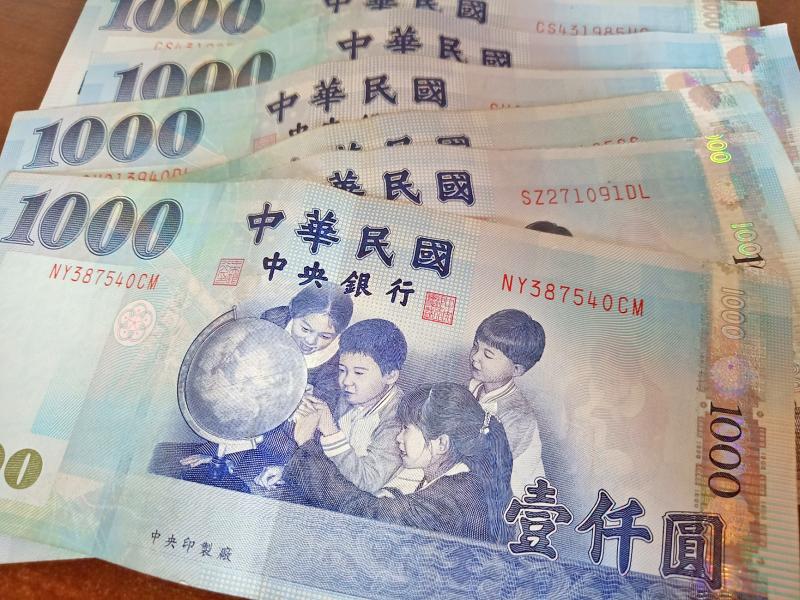The nation’s money supply, as measured by M1B and M2, last month advanced 9.81 percent and 8.12 percent respectively, as securities accounts declined and time deposits picked up, the central bank said on Tuesday.
The growth rate of the narrower M1B measure, which refers to cash and cash equivalents, slowed further as corrections on the TAIEX drove investors to the sidelines, the central bank said.
Their conservative sentiment accounted for a decline of NT$94.5 billion (US$3.2 billion) in securities account balances, the steepest fall in 12 years, it said.

Photo: Tsai Ching-hua, Taipei Times
The broader M2 measure — which includes M1B, time deposits, time savings deposits, foreign currency deposits and mutual funds — gained 8.12 percent year-on-year, thanks to fund flows to time deposits and foreign currency deposits, the bank said.
Time deposits and foreign currency deposits climbed to new highs of NT$15.2 trillion and NT$7.8 trillion respectively, aided by an interest rate hike of 25 basis points in March and expectations that the US dollar would perform well, it said.
Higher interest rates attracted local firms to park profits from sales and money intended for cash dividend payouts, the bank said, adding that their choice of foreign currency deposits reflected expectations of a robust US dollar.
Savings deposits held by foreign investors surged 13.5 percent to NT$259 billion, indicating that foreign stock players did not quit the local bourse altogether, but are waiting for an opportunity to rejoin, it said.

Nvidia Corp CEO Jensen Huang (黃仁勳) today announced that his company has selected "Beitou Shilin" in Taipei for its new Taiwan office, called Nvidia Constellation, putting an end to months of speculation. Industry sources have said that the tech giant has been eyeing the Beitou Shilin Science Park as the site of its new overseas headquarters, and speculated that the new headquarters would be built on two plots of land designated as "T17" and "T18," which span 3.89 hectares in the park. "I think it's time for us to reveal one of the largest products we've ever built," Huang said near the

China yesterday announced anti-dumping duties as high as 74.9 percent on imports of polyoxymethylene (POM) copolymers, a type of engineering plastic, from Taiwan, the US, the EU and Japan. The Chinese Ministry of Commerce’s findings conclude a probe launched in May last year, shortly after the US sharply increased tariffs on Chinese electric vehicles, computer chips and other imports. POM copolymers can partially replace metals such as copper and zinc, and have various applications, including in auto parts, electronics and medical equipment, the Chinese ministry has said. In January, it said initial investigations had determined that dumping was taking place, and implemented preliminary

Intel Corp yesterday reinforced its determination to strengthen its partnerships with Taiwan’s ecosystem partners including original-electronic-manufacturing (OEM) companies such as Hon Hai Precision Industry Co (鴻海精密) and chipmaker United Microelectronics Corp (UMC, 聯電). “Tonight marks a new beginning. We renew our new partnership with Taiwan ecosystem,” Intel new chief executive officer Tan Lip-bu (陳立武) said at a dinner with representatives from the company’s local partners, celebrating the 40th anniversary of the US chip giant’s presence in Taiwan. Tan took the reins at Intel six weeks ago aiming to reform the chipmaker and revive its past glory. This is the first time Tan

CUSTOMERS’ BURDEN: TSMC already has operations in the US and is a foundry, so any tariff increase would mostly affect US customers, not the company, the minister said Taiwanese manufacturers are “not afraid” of US tariffs, but are concerned about being affected more heavily than regional economic competitors Japan and South Korea, Minister of Economic Affairs J.W. Kuo (郭智輝) said. “Taiwan has many advantages that other countries do not have, the most notable of which is its semiconductor ecosystem,” Kuo said. The US “must rely on Taiwan” to boost its microchip manufacturing capacities, Kuo said in an interview ahead of his one-year anniversary in office tomorrow. Taiwan has submitted a position paper under Section 232 of the US Trade Expansion Act to explain the “complementary relationship” between Taiwan and the US